So you’ve heard about Intuitive Eating…but is Intuitive Eating healthy? How can it possibly be healthy with full permission to eat whatever you want, whenever you want?
If you’re worried about Intuitive Eating being an all-out nosh fest of forbidden foods, you’re not alone in being worried about this myth. The good news is that Intuitive Eating is an evidence-based self-care program….it just also includes doughnuts, if you wish.
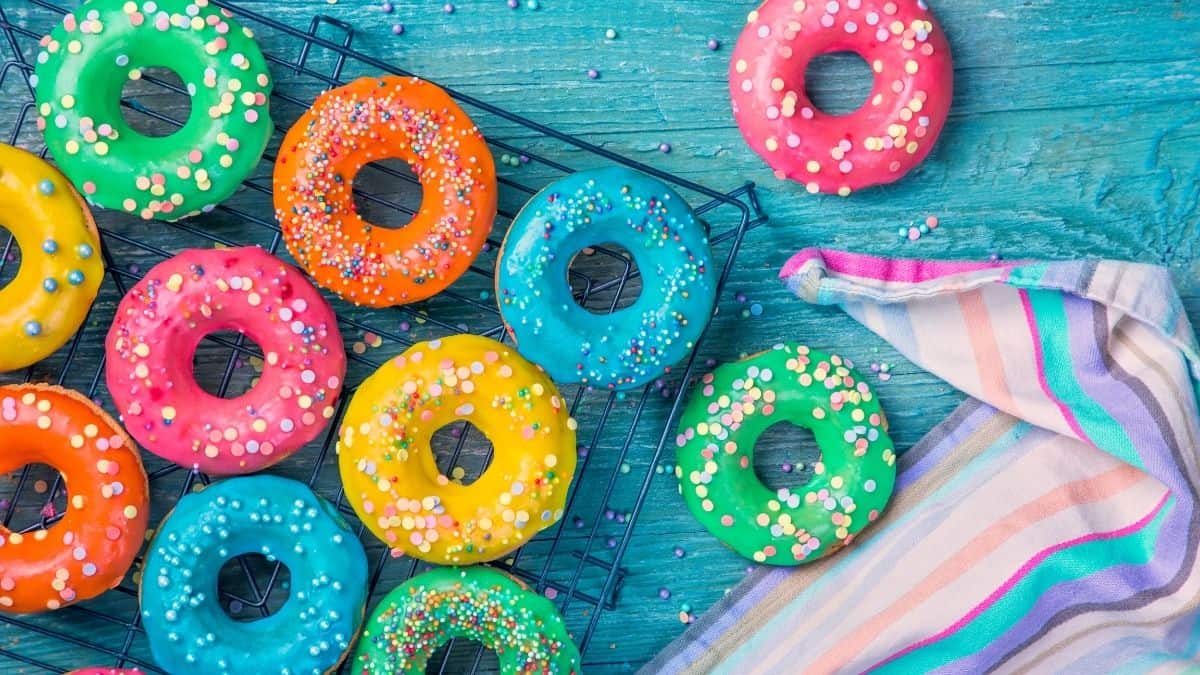
Evidence-based means that when researchers investigate how it really works and how people really feel and check different lab values – Intuitive Eating measures up as a health-promoting program.
And at my core as an Intuitive Eating dietitian, I’m all about science! Intuitive Eating is not a fluffy, feel-good scheme: it is solidly backed in real health. Let’s dive in!
What is Intuitive Eating?
Intuitive Eating is a self-care paradigm that empowers you to have a healthy relationship with eating and your body while offering you full permission to eat any food at any time.
Because this is so very counter-culture to the diet-based, thin-obsessed rules we are much more familiar with, Intuitive Eating does have quite a few myths surrounding it.
Intuitive Eating takes into account the foods that you’re eating. I am a dietitian, after all, so the fruits and veggies still matter. But what also matters is your mental health and being able to eat without shame or stigma. Even better? To be able to eat with joy, to offer yourself comfort, and to eat in a way that feels good, mentally and physically.
We can probably all agree that a bowl of fresh cherries is a nutrient dense snack. We can probably also agree that a piece of cherry cobbler provides different nutrition…can we also agree that the satisfaction of a piece of warm-from-the-oven cobbler topped with melting vanilla bean ice cream is not the same as fresh cherries?
I’m from Michigan: I love cherries – but I also know that those two versions of cherries offer different kinds of satisfaction.
With the freedom of Intuitive Eating, I always have permission to eat cobbler. And fresh cherries. And not feeling restrictions or shame around either means that they’re both morally neutral: they’re just food.
Intuitive Eating allows you to eat what you want, when you want, without shame or judgment.
Ready to learn a bit more? Dive on in, Gorgeous: What Is Intuitive Eating?
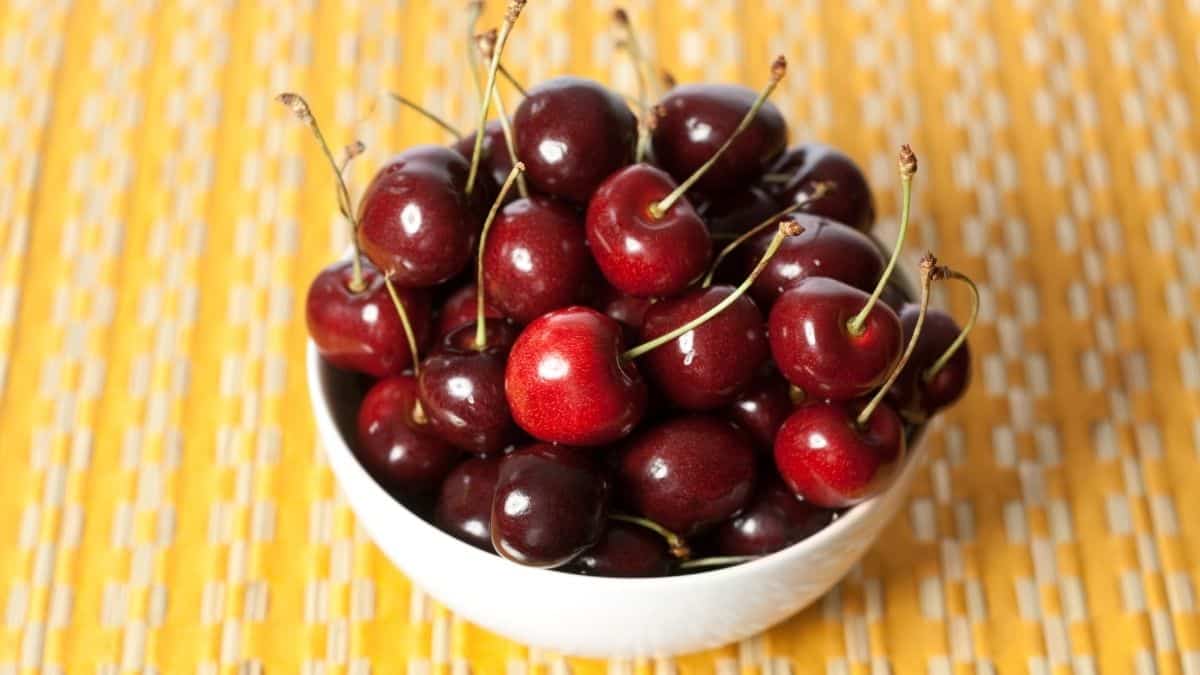
What does Intuitive Eating look like?
The nice thing about Intuitive Eating is that while I definitely have a few favorite go-to recipes and meals, Intuitive Eating is flexible.
For me, Intuitive Eating is about meeting my cravings and finding the combos of food that feel good and keep me fueled for my busy workdays, long walks with the hubs and Theo, and my morning workouts.
I aim to get a combo of all of the macronutrients – protein, fat, and carbs. I always aim to have something with a little zing for satisfaction. Some meals are really exciting and enjoyable, some are more functional, both are okay. Not every meal needs to be the best meal you’ve ever eaten.
I talk through my thought process for what I eat in a day on my Instagram stories once in a while (making sure to keep some things ambiguous, like specific portions, so there is no comparisonitis! It’s about the WHY of the food choices). Now, this doesn’t mean that you should follow what I eat, bite for bite, but rather that you can apply the same thought processes to your meals to find ones that you love and feel good eating.
What does “healthy” even mean?
Many people would like to over-simplify and incorrectly summarize health as your size, specifically as your BMI, which is a metric of how much you weigh as compared to your height.
BMI is highly problematic as a metric of health, but so too is weight.
We used to think that weight loss = gaining health. But as a field, science has learned to do more accurate research and to be able to interpret the data with a more holistic and inclusive lens.
What we’ve discovered is that the real determinants of health are your health behaviors, not the number on the scale.
What are examples of health behaviors?
- Your physical activity on a daily and weekly basis
- How you cope with and manage stress
- Your dental care…how long has it been since you’ve flossed?
- How many veggies do you eat on a typical basis?
- Are you drinkin’ that water?
- Are you overusing alcohol? Taking any drugs?
- Do you know and protect your own emotional boundaries?
You can be healthy – or unhealthy – at any size. It is your behaviors that matter, not your weight.
More on that, with a great review of some recent research, right here: Can You Really Be Healthy At Every Size? (HAES Explained!)

Is it possible to eat healthy on intuitive eating?
Not only is it possible to eat healthy while eating intuitively, but it is also probable.
Firstly, Intuitive Eating is a journey. As you discover and let go of your own food rules, there will be a time in which you’re learning your hunger and fullness cues. This comes with trial and error – as you practice getting comfortable and eventually neutral around your “off-limits” foods, you can likely expect to eat past fullness. This is normal, and it won’t last forever.
With the trust that you’re actually allowed to eat any food at any time, those appealing “off-limit” foods will no longer have a siren call to you. Even the ice cream in the freezer, even the sweet and crunchy cereal in the fun boxes.
Once you really have let go of your food rules and morality around eating, your body will naturally crave a variety of foods. We’ll cover the science behind this a bit later in the article.
In the meantime, let’s answer one really common question I get again and again (…and again): Can you lose weight with Intuitive Eating?
Can you lose weight with intuitive eating?
This is such a common question because diet culture would have us believe that being thin is healthier, better and how to achieve your best life. People do want to have a good relationship with their bodies and eating…but most of us also want to be thin.
Here’s the truth: I can’t promise that your weight will go up, down, or even change at all with Intuitive Eating. Even though I am a dietitian, I cannot predict what is the best weight for you and your body, but your body can.
The best weight for your body is the one that is easily maintained and the weight at which you feel good, both mentally and physically. This is called your set point. More on that here: Set Point Weight Theory: What It Is & How To Find It.
And let’s answer one more common question: is it possible to misuse Intuitive Eating or have it be done in an unhealthy way? This next section covers just that!
Can Intuitive Eating be unhealthy?
Can true Intuitive Eating be unhealthy? Not so much. It does take time and practice (and the right tools) to unlearn your own food rules and to banish diet culture for good. But once you’re comfortable with eating in a truely Intuitive way, your body provides you with the guidance that you need to serve her well.
And as an Intuitive Eater, not only are you able to listen to her needs, you trust one another and you follow through. Beautiful.
On the other hand, can an IG influencer get things wrong and turn Intuitive Eating into another diet and make this faux-IE unhealthy? Yes.
An example of faux intuitive eating? Thinking you “should” always pick the donut, pizza, cookie, etc. now that you “can” and ONLY picking this. At the same time, avoiding a fresh salad because you deem it “diety” and feel like you “shouldn’t” enjoy it as an intuitive eater.
The reality is YOU should be making your own food choices based on what serves you mentally and physically, not as a reaction to (or in rejection of diet culture). Don’t “should” yourself!
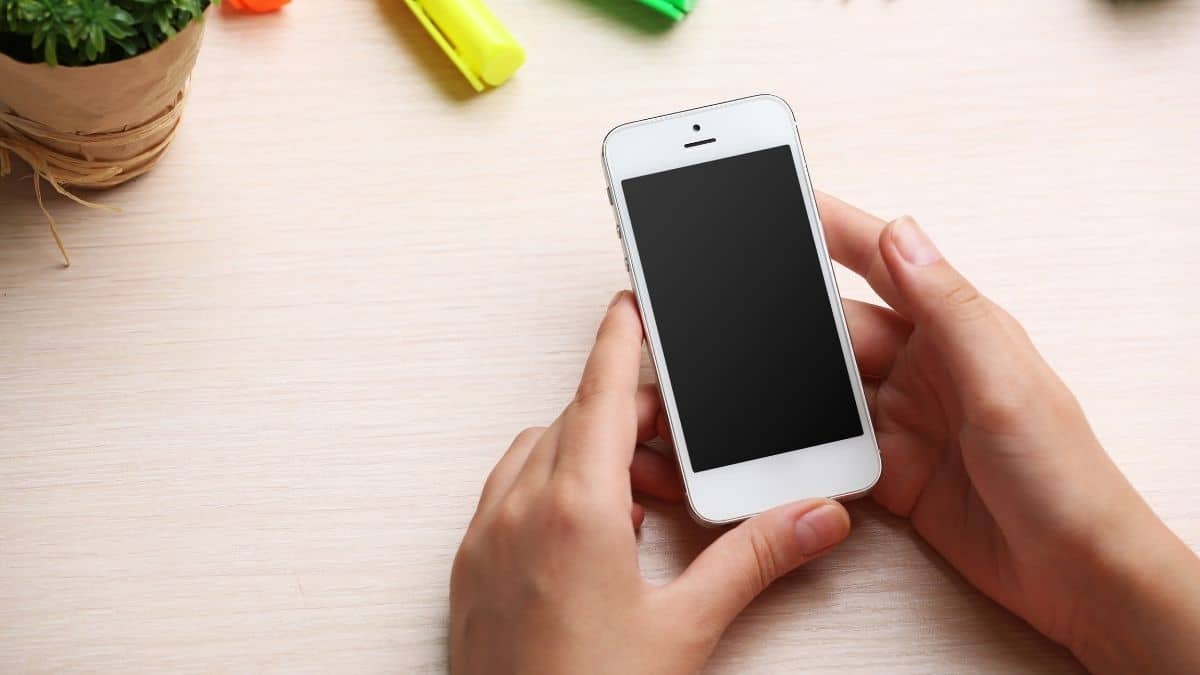
Does Intuitive Eating actually work?
Sooo…wondering what you mean by “work?”
Usually, when folks are thinking about “healthy” they’re thinking about weight loss. As we’ve chatted through before, you may or may not lose weight with Intuitive Eating.
But bigger picture: does Intuitive Eating empower you to have a healthy balanced life, with less stress and more satisfaction and nutrition? Yes! Let’s explore the research.
Are Intuitive Eaters healthier?
Wanna know something really great? Those who are Intuitive Eaters tend to eat a greater variety of foods, have fewer symptoms of disordered eating and end up eating more nutrient-dense foods (this means more vitamins, minerals, fibers – the “healthy” stuff in food).
Let’s look at a few of the studies that look at Intuitive Eating and true metrics of health:
- Intuitive Eaters are less likely to binge eat than the general population.
- Intuitive Eating strongly promotes mental health, with Intuitive Eaters having better self-esteem and more body positivity.
- Intuitive Eaters have lower C-reactive protein levels in their blood, which is a lab value that indicates inflammation.
- Intuitive Eaters have healthier blood cholesterol values.
- In a study of teenagers, those who used the nutrition facts label more often had a greater risk of binge eating. This helps us to understand that listening to our own body cues is more valuable and healthy than using an app or external cue to make decisions around food.
As the research continues to unfold, we’ll learn more and more about the benefits of Intuitive Eating and how to best use this tool to promote true health and wellness.
And to circle back to a big question about the actual nutrients in food. You know: those vitamins and minerals and fiber? Those are still important. There are ten principles of Intuitive Eating, with Gentle Nutrition being one of them.
Gentle nutrition is the principle that guides eaters to include those nutrient-dense foods, such as fruits and veggies. But instead of having strict rules or an inflexible guidebook on how to eat them, Intuitive Eating makes space to enjoy those foods that make us feel good. Totally different from a fad diet!
If you’re curious about Gentle Nutrition and how it fits into the larger picture of Intuitive Eating as a whole, check out this post: Getting Started With Gentle Nutrition.
Maybe you’re ready to dive in and get started? Here is where I recommend you get started.
How do I get started with Intuitive Eating?
Intuitive Eating saved my own health and life after a struggle with disordered eating that lasted for years. Gone now are the all-encompassing worries about food, obsessive weighing, and anxiety about my worth being tied to the number on the scale. My mission is to spare women the same heartache and shame that I experienced, day in and day out, during those dark days.
You’ve decided you want to give this a try? Bravo for making the brave decision to live your best life with food freedom.
You might be wondering how to get started with Intuitive Eating?
While there are certainly plenty of “right” answers here, I have one simple step that I recommend for all my clients as they decide to begin their own personal journey of Intuitive Eating.
What is the ONE exercise that I recommend to my clients as a first step to becoming an intuitive eater? You’re going to have to click here to find out: Simple First Step To Becoming An Intuitive Eater.
Key takeaways: Is Intuitive Eating healthy?
I know that when you first hear about Intuitive Eating and the whole ‘permission to eat anything’ clause, it is really normal to wonder, “Is Intuitive Eating healthy?” We’ve grown up in a culture that worships diets, thinness, and food rules. Anything outside of that can feel foreign and even weird.
But our better research has clearly demonstrated that our relationship with food and eating is just as important as what we eat.
And on top of that, our weight has much less of a bearing on our health than we’d ever thought. Our health behaviors, including our mental health, physical activity, and what we actually eat, are what matter.
Let me ask you this: are you reading this post and feeling like you’ve finally found your people? Yes? Oh my goodness, that is so exciting! I’d like to invite you to join the club: The SociEATy, the group of amazing, like-minded women who are learning to eat in a way that feels good. You deserve to have peace with your food, eating, and body: I can show you how. Join us!
XOXO-
Colleen


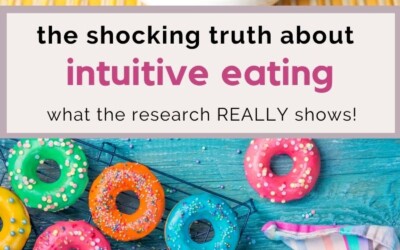
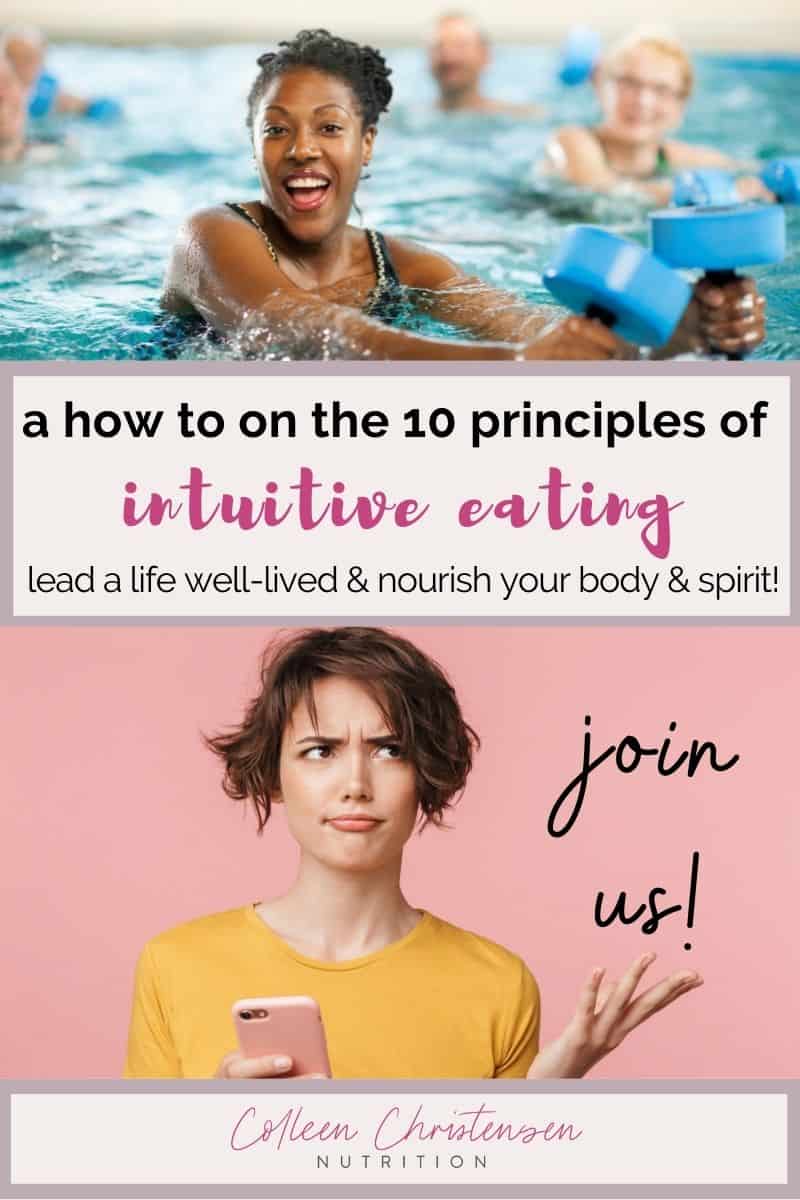
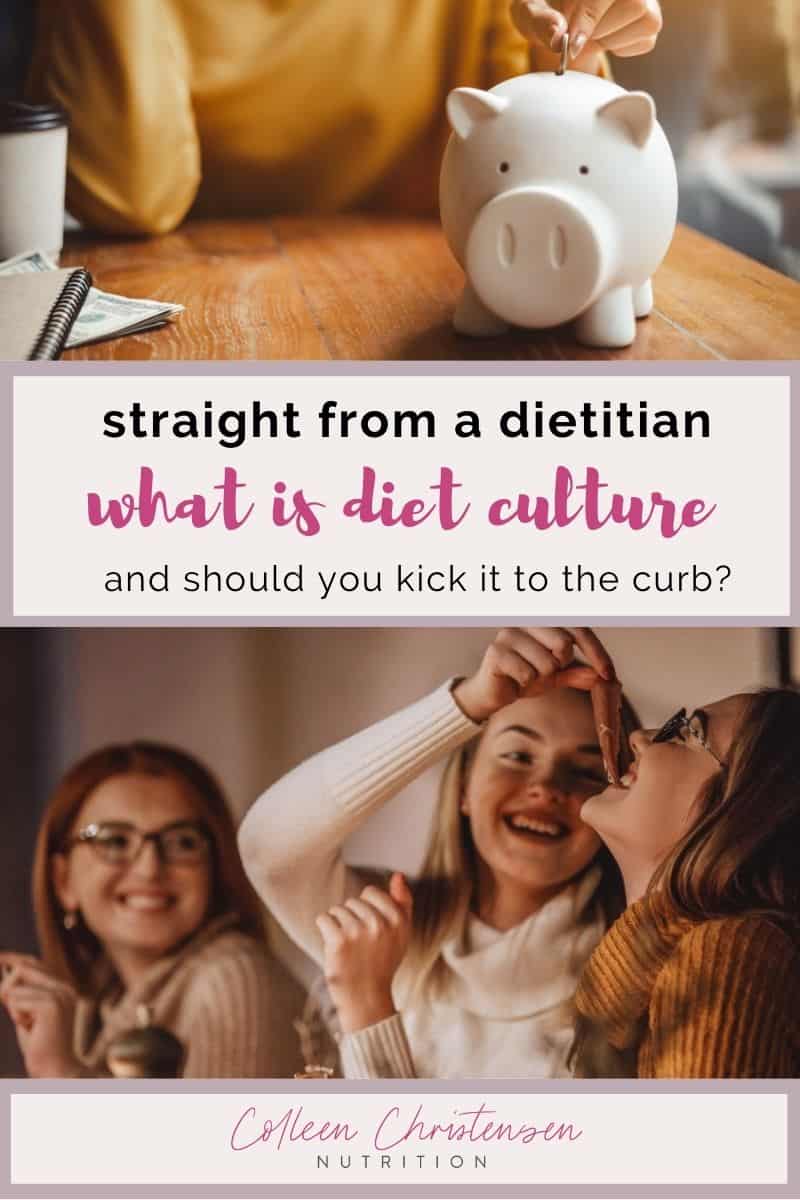
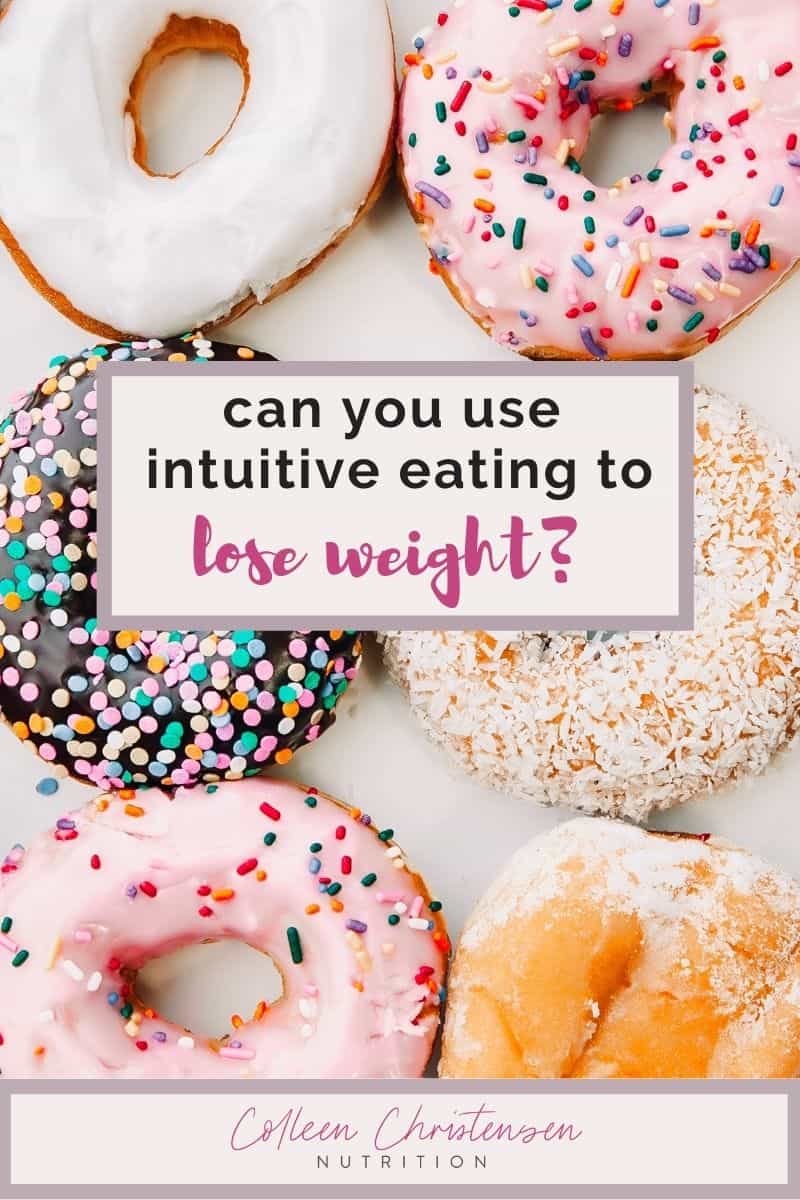




Leave a Reply